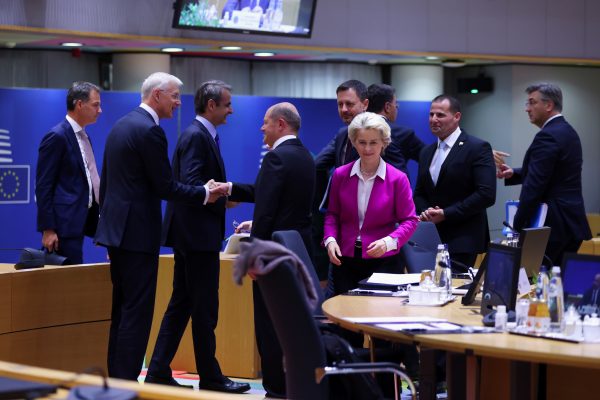The war in Ukraine underscores how easily and quickly the trading ties between nations, once the measure and symbol of their comity, can be undone and weaponised. That conflict triggered an unprecedented suite of economic sanctions as governments threw their trade and investment heft behind their arsenals on the ground, gumming up global supply chains and sending energy, fertiliser and food prices soaring.
Sanctions and their ilk are at the juddering edge of systemic fragmentation. The trend predates the Ukraine war. It is an old idea, going back centuries, but perhaps in a newly reinvented form.
Over the past decade, nations have increasingly turned to economic coercion and trade protectionism to meet geopolitical upheaval.
China has flung sanctions at Lithuania and embargoed trade with Australia and others. The United States has used trade and investment barriers to confront Beijing’s growing technological capabilities in defence and high-tech manufacturing, especially advanced chips. The breakdown of the dispute settlement mechanism at the World Trade Organization stymies the ability of economies to define the proper bounds of national security exemptions to trade rules.
Yet the increasing prominence of sanctions as a tool of statecraft is occurring amid structural shifts in the global economy that call their long-term viability into question.
The latest issue of East Asia Forum Quarterly, ‘An age of sanctions’, details the impact of sanctions as they rip well beyond the battlefield. It explores how far sanctions have succeeded in hobbling Russia’s war machine and questions their deterrent value outside of conflict or universal application. It details how supply chains have reshuffled around the reach of regulators. It asks how nations are using their currencies to plumb opportunities created by the conflict. It explores the rising use of national security exceptions to multilateral accords and the disproportionate impact sanctions have had on the most vulnerable populations.
This conversation comes at a time when global trade stands at a crucial crossroads. The multilateral trading system that underpinned globalisation for three-quarters of a century is being sundered by power politics and fogged by mistrust. Global growth is projected to decline again this year for the second year and remain anaemic, which risks the post-COVID-19 economic recovery. Inflation, the rising rivalry between the world’s two largest economies and Russia’s protracted invasion of Ukraine weigh heavily on the global outlook.
In this week’s lead article, drawn from his contribution to the Quarterly, Nicholas Mulder looks at how ‘the mixed results of the economic campaign against Russia demonstrate that a powerful countervailing trend has gone largely unnoticed: the rise of Asian commercial power as a facilitator of trade diversion that blunts Western sanctions’.
While it experienced ‘a brief financial crisis’ after being hit with Western sanctions in response to its invasion of Ukraine, ‘Russia rerouted much of its trade towards Asian economies and weathered the initial sanctions onslaught’, Mulder writes. ‘Asian economies have acted as alternative destinations for Russian exports’ — most notably crude oil — ‘as well as new sources of imports’, including — worryingly for those with an interest in degrading Russia’s ability to wage war on Ukraine — microchips, meaning that ‘in the short run Western export controls on technology have not created a chip famine in Russia.’
As Asia’s growing economic power weakens the coercive potential of the West, the region reveals new features on the global sanctions landscape.
Chinese economic sanctions are novel in their motivations and methods, often applied informally and opaquely. But it’s not at all clear that the Chinese version works any better than the Western one.
The THAAD missile defence system still sits ready to defend South Korea primarily from the North Koreans, despite China’s campaign of sanctions on South Korean interests in response to its deployment. Some, though not all, Australian export industries have been hit hard by Chinese import bans in response to a range of Australian policies that damaged Chinese interests. But in exchange for forfeiting its hard-won reputation as a reliable trading partner, all Beijing got in return was AUKUS and the hostility of the Australian public and political class.
In both countries, trade with China has increased over the years since sanctions were applied, pointing to the reality that with a trade-dependent economy, China can’t afford to enact the kind of wide-ranging economic sanctions that might actually have a chance of forcing policy change in other countries. Chinese sanctions against smaller powers have so far been too narrow to have much coercive impact, though big enough to breed a political backlash.
Although sometimes morally justified, it’s difficult to see much evidence of success with sanctions that are not universally agreed and applied. Tom Westland in another feature from this issue of EAFQ argues that they also weaken the very system that built the economic weapons in the first place. The United States has had strong support from the West in its financial sanctions against Russia, but to much of the Global South it has in effect weaponised its most valuable asset — the US dollar reserve currency.
The uncertain outlook for the cost–benefit balance of sanctions as the structure of the global economy changes suggests the need for new thinking about their use as a tool for disciplining perceived bad behaviour or meting out political punishment in the international system.
The world is at an inflection point no less profound than that during the postwar ruins which created the modern global trading system in 1947. As a new landscape fraught with uncertainty emerges, sanctions and the weaponisation of trade have become the hallmarks of an age of economic fragmentation and dis-integration. If they portend a return to global conflagration, these essays hopefully suggest ways to choose another course.
The EAF Editorial Board is located in the Crawford School of Public Policy, College of Asia and the Pacific, The Australian National University.

